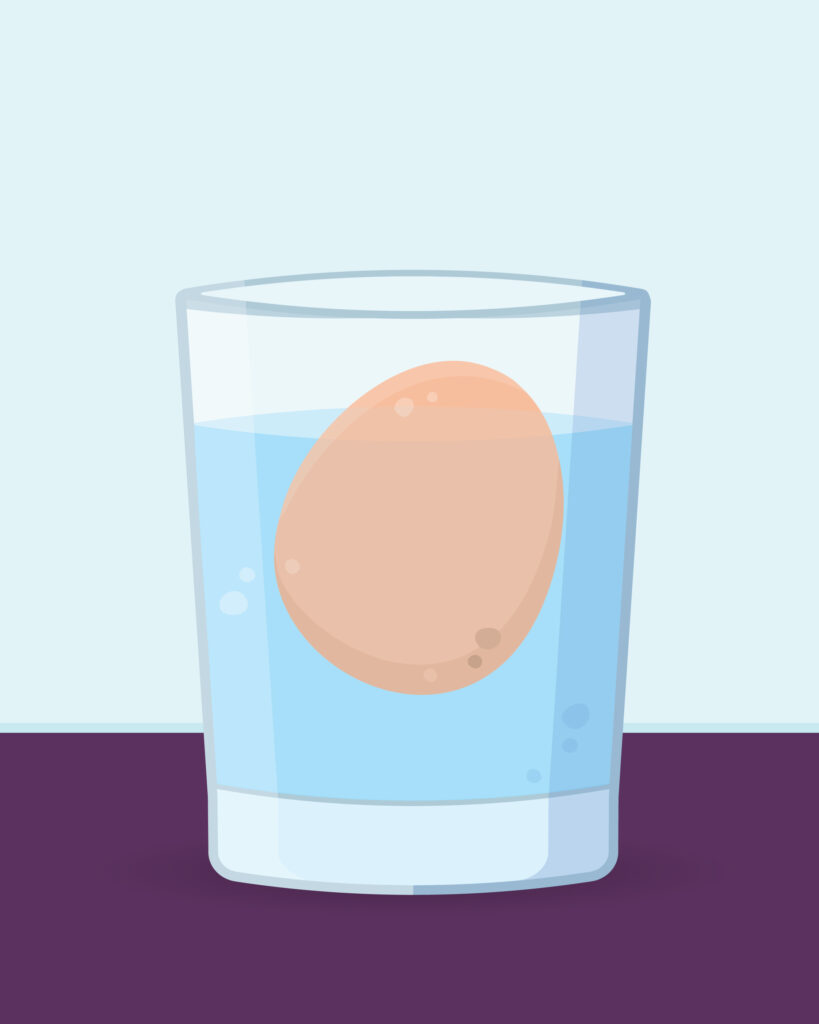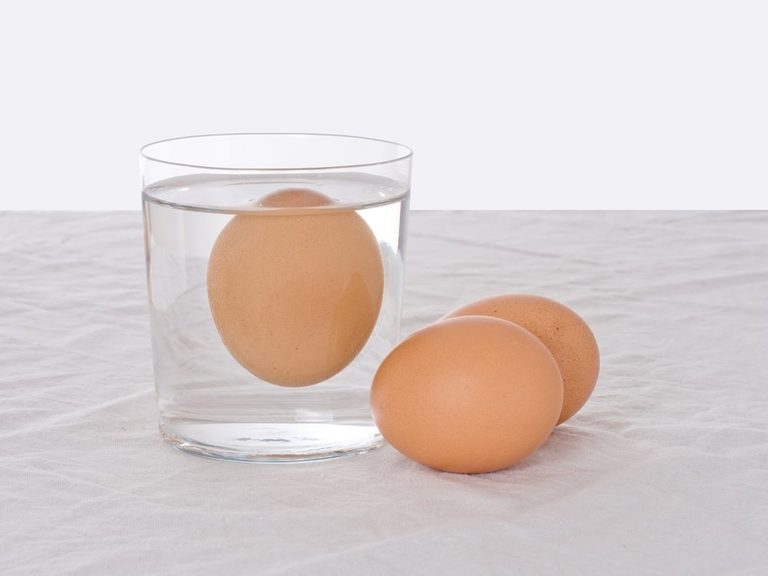Many people worry that their eggs aren’t going to be safe to eat. The truth is, though, there’s not a lot you need to do before eating them. They just look really gross when you’re buying them. If the eggshells crack easily and you see any signs of mold, throw it away.
If you want to be able to tell how fresh your eggs were, you can always ask your grocer. He or she will usually let you know. However, if you prefer to try other methods, you can also check the inside of the shell for discoloration.
There are a couple of things you should watch out for, however: white spots on the yolk, bad smell, and even greenish coloration. These are all clear signs that your eggs are old.
Can You Eat Eggs That Float?
Eggs have been used for thousands of years, but they were never considered to be a healthy food until recently. Now, many people enjoy eating them on a daily basis. However, there is one thing that you need to know before you start cooking with eggs.
If you want to cook with egg whites, you should make sure that the yolks are removed. This means that you’ll end up using just the white part of the egg. If you don’t remove the yolk from the egg, then you could end up getting sick. In fact, some people get extremely ill after they consume raw or undercooked eggs.
However, you can still enjoy the benefits of eating eggs without having to worry about the health risks. The key is in how you prepare the eggs.
You should always cook your eggs thoroughly. That way, you won’t risk any potential illnesses. To do this, simply boil your eggs for about four minutes. After that, let the eggs cool down completely. Then, peel off the shell and cut open each egg.
How Do You Check If Eggs Are Bad?
Eggs have become a popular food item in recent years. Unfortunately, many of them contain harmful bacteria that can make people sick. If you want to know how to tell if your egg is safe, then this article will teach you everything that you need to know.
First of all, you should look for the USDA stamp. This means that the product has been inspected by a government agency. The stamp also indicates that the eggs were produced in an approved facility.
If you don’t like the idea of eating raw eggs, then you can always cook them. However, you’ll be able to avoid any health problems. To do so, just boil the eggs for three minutes. After that, let the eggs cool down before you eat them.
Another way to ensure that your eggs are healthy is to buy organic ones. Organic foods aren’t treated with pesticides or other chemicals. As a result, they’re safer than their conventional counterparts.
Can You Eat Eggs 2 Months Out of Date?
Eggs have been a staple food source since the dawn of time. However, you should always check the expiration dates on all foods before consuming them. This is especially true for egg products.
You should also make sure that the eggs that you buy are fresh. If you don’t know how long ago they were purchased, then you shouldn’t consume them. You could be eating expired eggs.
If you’re worried about whether or not you can eat old eggs, then you might want to read the article below. This is a guide that explains why you need to avoid these types of eggs.
There are many reasons why you should never eat old eggs. First, they may contain harmful bacteria or mold. Second, they could spoil and become unappetizing. Third, they could give you health problems.
The first reason is the most important one. Bacteria is a very common problem that you will encounter in the kitchen. It’s possible to get sick from ingesting it. Mold is another dangerous substance.
How Do You Test an Egg If It’s Any Good?

It seems like everyone knows how to check the quality of their eggs, but most of them don’t know exactly how to go about doing so. So, here is an article that explains how you can check your eggs.
If you’re thinking of buying a new pair of shoes, you should always try on the shoes before you buy them. You need to make sure that the size of your feet fits the shoe perfectly. If the shoe doesn’t fit properly, then it could cause you pain down the road.
You can also use this method to check the quality of your eggs. All you have to do is put a few drops of water in the shell of the egg. Then, you need to wait a few minutes. After that, you’ll be able to tell whether or not the egg is fresh by checking its shape.
The last thing that you should look for when testing an egg is the smell. This is because rotten eggs are very strong smelling. And you definitely don’t want to eat anything that smells bad!
Is the Egg Float Test Accurate?
There is a popular myth that says that if you place an uncooked egg on top of your belly, it will sink into your stomach, but if you put a raw egg in boiling water, it won’t break. This isn’t true. The truth is that both cooked and uncooked eggs will float in warm water.
This phenomenon happens because the air inside the egg expands when it gets warmer. As a result, the pressure on the outside of the shell decreases, causing the egg to rise above the surface. If you want to know whether or not the egg is safe for consumption, you should use the egg float test.
If you’re planning to have a baby, then this technique can be very helpful. You’ll need a clean glass or ceramic dish, a bowl of hot tap water, and an uncooked or partially cooked egg. Place the egg in the dish, cover it with the lid, and leave it for 10 minutes. Then remove the egg from the container.
Can You Eat Eggs 3 Months Old?
Eggs are a nutritious food that is packed full of vitamins, minerals, and protein. So, you might be wondering whether you can eat eggs three months after their expiration date. The answer to this question depends on how you store your eggs.
If you keep them in the fridge, then they will stay fresh for up to four weeks. However, once you remove them from the refrigerator, you should discard them.
However, you can still use eggs when you’re storing them in the freezer. You need to make sure that you thaw the frozen eggs before using them. This way, you won’t have any problems with spoilage.
When you’re cooking, you don’t want to cook your eggs until they’re completely hard. If you do, you’ll end up wasting all of the nutrients that are in your egg yolks.
Instead, you should try and get the best quality eggs that you possibly can. That means that you shouldn’t buy anything other than organic, free-range, or cage-free eggs.
How Long Can Eggs Last in the Fridge?
Eggs have a shelf life of around three weeks. This means that you should check them regularly so that you know when they’re ready to be used.
If you want to keep your eggs fresh for longer, you need to store them properly. You should put them into a refrigerator immediately after buying them. If you don’t do this, you’ll notice that the egg whites will start to get dry and hard.
You can also freeze your eggs in order to extend their lifespan even further. Just make sure that you take them out of the freezer as soon as possible.
Another thing that you should consider is how many eggs you buy. For example, you shouldn’t buy more than one dozen per week, unless you like eating a lot of scrambled eggs.
If you’re thinking about purchasing a new piece of kitchen equipment, then you might want to read the article below. It contains information on the best way to choose between different types of cookers.
Can You Eat 3 Week Old Eggs?
You may be wondering whether you can eat three-week-old eggs. The answer is yes, but it depends on how many people have eaten them before you. Eggs that were laid by hens in the past few weeks should be safe to eat. However, the same isn’t true of eggs from older chickens.
It’s also important to know where your eggs came from. If you bought them at a grocery store, you’ll want to make sure that they haven’t been sitting around for more than a month.
If you’re buying eggs directly from a farmer, then you can take comfort in knowing that the chickens are being raised well and aren’t living in unsanitary conditions.
A lot of people don’t realize that eating raw eggs is perfectly fine. In fact, it might even be beneficial. Raw eggs contain high levels of nutrients, including vitamin D, B vitamins, choline, and lutein.

